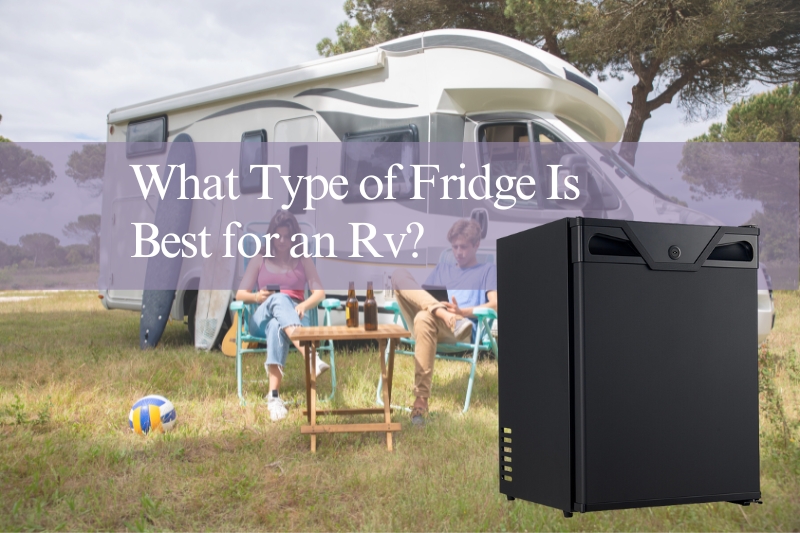You’re packing for a scenic journey through the Rockies, and it dawns on you that your RV’s old fridge just won’t do for the long haul ahead.
While you envision the convenience of a fully stocked, reliable refrigerator humming quietly in the corner of your compact kitchen, the question remains: which type is the best fit for your RV lifestyle?
Absorption refrigeator offer the flexibility of running on propane when you’re off the grid, while compressor fridges cool quickly and efficiently, albeit relying on a steady power supply. Then there’s the residential fridge, with its familiar feel and spacious interior, yet demanding more power and space.
Considering your travel habits, energy availability, and the size of your RV, you’re about to make a decision that will affect not just your meals, but your entire road-tripping experience.
Stay with me as we navigate the pros and cons of each type, helping you pinpoint the perfect refrigeration companion for your upcoming adventures.
Understanding RV Refrigerator Types
When outfitting your RV, it’s crucial to understand the differences among absorption, compressor, and thermoelectric refrigerators to make the best choice for your on-the-road lifestyle.
Absorption fridges are versatile, running on propane or electricity, making them a common pick. However, they require level parking to operate optimally.
For efficiency, a compressor fridge is your ally; it cools quickly without needing to be level, but it relies on AC/DC power, so it’s wise to consider shore power availability.
Thermoelectric fridges are less common, using a cooling system that’s great for smaller needs but not suitable for large-scale cooling. To ensure you pick the best RV refrigerators, take into account the space in your RV, and look for features that fit your travel habits. An Energy Star certification signifies a model that won’t drain your resources.
This buying guide isn’t complete without mentioning 3-way refrigerators, which offer flexibility with propane, AC, or DC power options, in contrast to 2-way models limited to propane and AC power.
Assessing Your Cooling Needs
Understanding the different types of RV refrigerators, it’s now crucial to evaluate your specific cooling requirements, starting with the dimensions of your available space. The right fridge will fit snugly and not overbear your kitchenette, ensuring you don’t compromise on living area or aesthetics. Manufacturers use various sizes and designs to cater to diverse spaces and needs, so knowing your RV’s interior is step one.
Compressor fridges are a popular choice because they cool down quickly and can be more energy-efficient. However, they typically require a steady power source. If you’re off-grid, you’ll likely need to install an inverter to use AC power, or choose a fridge that can run on DC power.
Here’s a quick table to stir your thoughts and help you visualize the potential of your space:
| Feature | Your Consideration |
|---|---|
| Space | Measure your RV cutout |
| Efficiency | Eye Energy Star models |
| Capacity | Enough for your needs? |
| Features | Freezer, reversible door? |
| Power | Shore, battery, or both? |
As you mull over these, think about the cool drinks and fresh food awaiting you after a long hike or the comfort of a well-stocked kitchen while exploring the unknown. The right fridge will make all the difference in your RVing adventures.
Power Source Considerations
What type of power will your RV fridge be running on? This is a crucial question you’ll need to tackle before making a decision. Your RV’s power sources, which may include propane, AC, DC, or even solar power, must be compatible with the refrigerator you choose. If you opt for a 12V compressor fridge and don’t have access to shore power, it’s essential to consider the fridge’s power consumption in relation to your RV’s power capabilities.
It’s not just about ensuring the fridge turns on. You’ll also need to evaluate the need for additional equipment. Some fridges, like those that run on propane or are dual-powered, might require high-performance propane tanks or inverters. And let’s not forget about power fluctuations. They can wreak havoc on your fridge’s performance. To combat this, you might consider investing in a voltage protector to prevent potential damage.
Lastly, think about where you’ll be using your RV. Will you have reliable power sources when traveling or while parked off the grid? Ensuring uninterrupted operation of your refrigerator, no matter where you are, is vital for a stress-free adventure. Choose wisely, and you’ll keep your food fresh wherever the road takes you.
Space and Installation Constraints
Before selecting your RV’s fridge, accurately measure the designated installation area to ensure a proper fit. Width, height, and depth are crucial dimensions to record, as they’ll guide you toward fridges that can slide into place without hassle. It’s also vital to check that fridge doors can swing open fully; otherwise, you’ll find yourself wrestling with your appliance just to grab a snack.
Consider how much food and drink you’ll typically store. If you’re a weekend warrior, you mightn’t need as large a fridge as someone living on the road. But remember, bigger isn’t always better in an RV setting. The storage capacity must align with your lifestyle while respecting the spatial limits of your home on wheels.
Don’t overlook the fridge’s weight—it has a direct impact on fuel efficiency. Heavier models might offer more features but can also lead to higher gas costs. Strike a balance that won’t weigh you down unnecessarily. After all, your RV adventure should be about freedom and ease, not being anchored by an oversized refrigerator.
Choose wisely, and you’ll enjoy cool refreshments and fresh ingredients no matter where your travels take you.
RV Refrigerator Maintenance Tips
Having selected the perfect fridge for your RV based on size and efficiency, it’s crucial to maintain it properly to ensure its longevity and optimal performance. Regular care keeps your fridge running smoothly and prevents unexpected breakdowns during your travels. Here’s what you need to do:
Firstly, cleanliness is paramount. Make sure to clean both the interior and exterior regularly to prevent odors and maintain hygiene. Secondly, keep an eye on the seals and replace them if you notice any wear. This ensures your fridge remains well-insulated and efficient.
Additionally, while your RV is parked, remember to keep the refrigerator level. This prevents operational strain and potential damage. Overloading the fridge can also strain the cooling system, so aim to keep it well-organized and avoid packing it too full.
To help you remember the essentials, here’s a handy table to refer to:
| Maintenance Tip | Reason |
|---|---|
| Regular cleaning | Prevents odors and maintains hygiene |
| Check and replace seals | Ensures proper insulation |
| Keep refrigerator level | Prevents damage, maintains efficiency |
Lastly, use a voltage protector to shield your fridge from power fluctuations, securing your investment against electrical mishaps. With these tips, you’re set for a trouble-free, cool journey on the road.
Frequently Asked Questions
Which Type of Refrigerator Is Commonly Used in Rvs?
You’ll typically find absorption refrigerators in RVs because they can run on propane or electricity, making them versatile for travel. However, consider your needs as other types may suit you better.
Is It Better to Run RV Fridge on Propane or Electric?
You’ll find running your RV fridge on electricity is more cost-effective when connected to shore power, but propane can be better for boondocking or when electricity isn’t readily available.
What Is the Most Reliable RV Refrigerator?
You’ll find that compressor fridges are often the most reliable for your RV, efficiently cooling with AC/DC power and handling various conditions without the need to be level. Consider brands like Dometic and Norcold.
How to Choose a Refrigerator for Your Rv?
You’ll need to measure your RV’s space, consider energy efficiency, and decide if you want features like digital controls or an ice maker when picking your refrigerator. Remember to check the cooling performance, too.
Conclusion
You’ve explored your options, now trust your instincts.
Match an RV fridge to your lifestyle; pick an absorption unit for versatility, a compressor for efficiency, or go big with a residential style for comfort.
Remember, balance your power sources, size constraints, and cooling needs.
With the right choice, you’ll enjoy fresh, chilled delights on every journey. Keep up with maintenance, and you’re set for the long haul.


